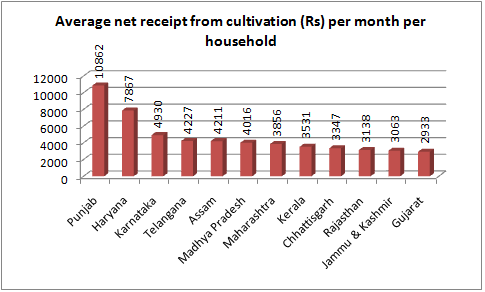Gujarat growth rate story busted: Cultivators' net earning less than national average, say NSSO data
In an important revelation, the National Sample Survey Organisation (NSSO), India's most authoritative data collection centre amidst decadal censuses, has said that Gujarat farmers' net income from cultivation is lower than 11 other major states out of a total of 21. The figures, released this month, say, the average net income per household from cultivation was Rs 2,933 per month during the agricultural year July 2012 to June 2013, which was not just drastically lower than some of the agriculturally advanced states like Punjab and Haryana, but also so-called backward states Assam, Chhattigarh, Madhya Pradesh and Rajasthan.
The data have been come amidst huge claims of Gujarat being a “success story” for other states to emulate with agricultural growth rate of around 9 per cent per annum over the last one decade as against a little over 3 per in the decade preceding it. The figures, culled out following the NSSO's 70th round of survey carried out over one year period, from January 2013 to December 2013, are part the latest NSSO report, “Key Indicators of Situation of Agricultural Households in India”.
According to the survey, as against the net receipt from cultivation per agricultural household of Rs 2,933 in Gujarat, the national average during the corresponding period was Rs 3,081. The highest monthly net receipts from cultivation per household was in Punjab (Rs 10,862), thrice that of Gujarat, followed by Haryana (Rs 7,867), Karnataka (Rs 4,930), and Telangana (Rs 4,227).
That even some of the poorer states fared better than Gujarat should be a matter of concern for state policy makers – net receipt from cultivation was Rs 4,211 in Assam, Rs 4,016 in Madhya Pradesh, Rs 3,347 in Chhattisgarh, and Rs 3,138 in Rajasthan. There is no explanation in the NSSO report about the reason behind poor net income of cultivators in Gujarat.
A breakup provided by the NSSO suggests that 58.4 per cent of agricultural households in Gujarat are directly depend on cultivation, and the next important earning source is agricultural labour (26.7 per cent). This is followed by nine per cent depending on livestock to make two ends meet, and just 3.7 per cent involved in rural enterprise as the main source of income.
While livestock does not earn rural households as much cultivation does, incomes from this source in Gujarat are higher than other states. Comparative data suggest that as against Rs 1,930 earned on an average in Gujarat from livestock, the income from this source is averaged at a poor Rs 763 in the nation as a whole. Gujarat farmers' earnings from this source, in fact, is worse than just one state, Haryana, Rs 2,645. Even Punjab lags behind Gujarat with Rs 1,658.
This has been made possible, apparently, on account of Gujarat's strong position in the milk cooperatives begun with the powerful Amul experiment decades ago. While the agricultural households in Gujarat dependent on cultivation – 58.4 per cent of 39,30,500 – are lower than the the national average of 63.5 per cent, interestingly, the state's farmers dependent on livestock (9 per cent) are one of the highest in the country – next only Haryana (9.1 per cent) and Tamil Nadu (10.2 per cent).
The NSSO figures also reveal that Gujarat's 26.7 per cent of agricultural households are dependent on wage labour for survival is higher than the national average of 22 per cent, and this is lower six out of 21 major states – Rajasthan (33.4 per cent), Punjab (31.9 per cent), Kerala (29.9 per cent), Tamil Nadu (29.3 per cent), Andhra Pradesh (28 per cent), and West Bengal (26.8 per cent). Average wages per agricultural household per month in Gujarat come to Rs 2,683, as against the national average of Rs 2,071.
While this may be suggesting marginalisation with a higher number of cultivators shifting to wage labour, on one hand, and animal husbandry, on the other, it seems that much fewer households are shifting to non-agricultural rural enterprises as the source of earning. Gujarat's about 3.7 per cent of the total rural households are involved in non-agricultural rural enterprises as against the national average of 4.7 per cent, with Kerala leading with 13.4 per cent.


Comments